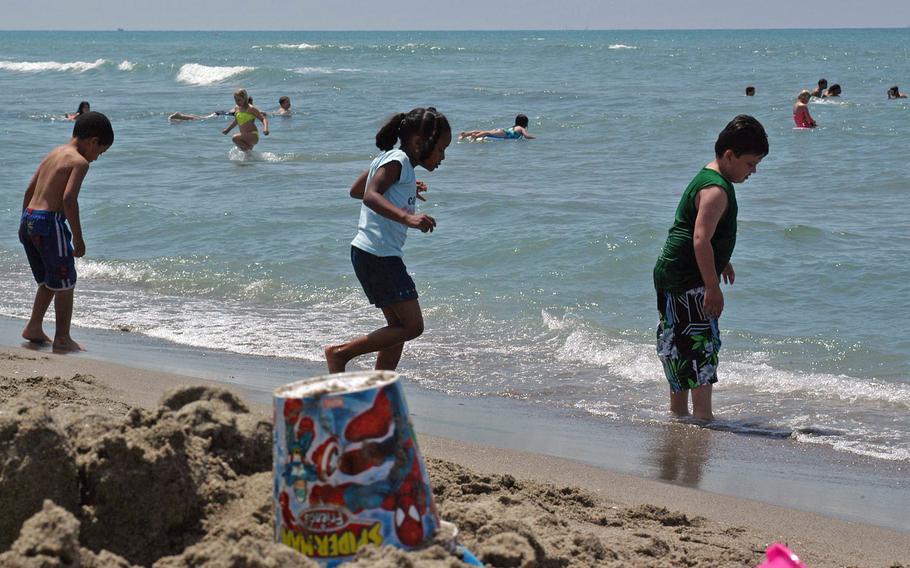Europe
Beach in Italy added to growing list of shuttered US properties in Europe
Stars and Stripes July 14, 2014

Kids from the school at nearby Camp Darby hit the American Beach in Tirrenia, Italy. (Kent Harris/Stars and Stripes)
VICENZA, Italy — “Dreaming of stretching out on your beach towel, soaking up some sun or wiggling your toes in the sand?” asks an ad for the American Beach by Camp Darby’s Morale, Welfare and Recreation department. “Dream no more!”
Seriously, dream no more.
The beach, operated for more than half a century for U.S. servicemembers on a stretch of Italian coastline in Tuscany, is headed for extinction, like scores of other U.S. military facilities in Europe over the past decade. In May, The Defense Department listed the unique property — the only known DOD-operated beach remaining in Europe — as among several properties to be given up and turned over to host nations.
The beach has been deemed to have little “intrinsic military value,” Installation Management Command-Europe spokesman Dan Thompson said in an email.
Getting it off the books would save $114,000 annually, Thompson said, along with other savings in “manpower/staff actions.”
“The cost avoidance accomplished by divesting sites with few regular visitors and little military value is part of an effort to become more efficient and use those resources for broader impact,” he said.
Now in the midst of what’s expected to be the beach’s last season, Camp Darby’s Morale, Welfare and Recreation Department personnel, disagreed.
“We take in more than $150,000 a year,” said Steven Mechur, MWR outdoor recreation supervisor. “We still make a little profit.”
Mechur said Camp Darby MWR has offered to pay all costs for the beach, to take no appropriated funds for it, to no avail.
“To close all that down … I just don’t want to see it go away,” Mechur said. “It makes no sense to me. ... I think it’s a shame.”
The beach, in the seaside resort town of Tirrenia, founded during Benito Mussolini’s fascist regime to be “The Pearl of the Mediterranean Sea,” offers similar amenities, at reduced cost, as adjacent Italian beaches owned by hotels or other concessions.
There are rows of chairs and umbrellas, cabanas, covered pavilions, beach volley court, kayaks, pedal boats, boogie boards, playground equipment, showers, snack and drink bars.
Its purpose has been to “enhance the readiness and resiliency of soldiers, families and civilians in Europe by providing an affordable and valued recreation site,” according to Grant Sattler, spokesman for U.S. Army Garrison Vicenza which oversees Camp Darby, officially known since it previous command, U.S. Army Garrison Livorno was closed, as the “Darby Military Community.”
In recent years, the small installation, which also offers a campsite and lodging to vacationing Defense Department and NATO personnel, reported more than 35,000 annual visitors.
Some American families return to vacation every year, staffers said.
“It’s a very peaceful area,” said staffer Vinnie Firriolo, who was part of a two-man crew that did the entire beach set-up this year, beginning in April.
“We do get a lot of people; a lot of people from Germany and England come. They love it.”
Among the things to love, Firriolo said, was that people speak English at the American beach, the parking lot is guarded and prices are lower. For example, an umbrella costs about $25 at an Italian beach but $15 at the American beach, he said.
Thompson said however that fewer people stationed in northern Europe had been visiting the beach since AAFES quit providing cut-rate gas coupons for people on leave. Now, he said, it’s used mostly by “local DOD personnel and (Italians who work for the U.S.) with a few visitors.”
Camp Darby’s primary mission has been to logistically support combat deployments, including equipment and munitions maintenance and storage, for rapid reaction and crises response operations.
Sattler said there were no current plans to close the campground or lodging at Camp Darby but that “residual impacts of the beach closing are still being evaluated.”
The beach dates back to the 1950s, constructed shortly after Camp Darby was established in a pine forest between Pisa and Livorno, three miles from Tirrenia.
At the time, American military beaches were more commonplace. There was also one, complete with free waterskiing, located on Lake Garda. And during the Vietnam War thousands of GIs spent their leave at “China Beach,” the 30-kilometer golden beach near the central coastal city of Danang. Numerous beaches and recreation areas remain in the states for use by DOD members.
Getting rid of the beach, along with a Bavarian golf course, skeet range and hotel and a variety of other facilities also being closed in this most recent round of cost-cutting would save $60 million annually, according to the Defense Department.
Pentagon spokesman Rear Adm. John Kirby told reporters at the time that the cuts would allow resources to be focused on higher-priority missions.
“It doesn’t at all change our military capability on the continent or degrade in any way our readiness to meet our security commitments there in Europe,” Kirby said.